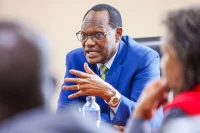Cell phone penetration rates are increasing rapidly in the world, with mobile phone operators turning their attention to the third world countries. However, that doesn’t mean phones are reaching everyone in these markets. As the penetration gets deeper, a gender gap is emerging in middle-income countries when it comes to mobile phone ownership.
Women are 14% less likely to own a mobile phone than men, according to a study conducted by Groupe Speciale Mobile Association (GSMA), an association of mobile operators. In the report by titled Connected Women’s Programme, several regions across the globe share mixed statistics when it comes to mobile phone ownership. For instance in South Asia a woman is 38% unlikely to own a phone than a man. In a region like Africa, Niger has a 45% gender gap. Democratic Republic of Congo has a 33%. Kenya has a 7%, largely driven by M-Pesa.
Interestingly, even when women own mobile phones, there is a significant discrepancy in mobile phone usage, with women using phones less frequently than men, especially for more sophisticated services such as mobile internet. In most countries surveyed, fewer women than men who own phones report using messaging and data services beyond voice.
“The universality and affordability of mobile presents us with the unprecedented opportunity to improve and enhance social and economic development; however, as our study shows, women in particular tend to be left behind as owners of mobile phones and as consumers of mobile services,” said Anne Bouverot, Director General, GSMA. “By addressing the gender gap in mobile phone ownership and use, we will deliver substantial benefits for women, the mobile industry and the broader economy.”
Barriers The top five barriers to women owning and using mobile phones from a customer perspective are cost; network quality and coverage; security and harassment via mobile; operator or agent trust; and technical literacy and confidence issues. Social norms and disparities between men and women in terms of education and income influence women’s access to and use of mobile technology, and often contribute to women experiencing barriers to mobile phone ownership and use more acutely than men.
The report reveals that 89% of women use their mobile phones to stay in touch with family and friends, with 68% reporting that they feel safe with their phones. The report found that achieving parity in ownership and use between men and women in low- and middle-income countries could bring socio-economic benefits, such as the availability of new education and employment opportunities, to an additional 200 million women; unlock an estimated US $170 billion market opportunity for the mobile industry by 2020 and deliver a positive economic contribution to society.
“Taken together, our research indicates that the gender gap in mobile ownership and use is driven by a complex set of socio-economic and cultural barriers that negatively affect women. Without targeted intervention from the mobile industry, policy makers, and other stakeholders, the gender gap in ownership and use is unlikely to close naturally on its own,” added Bouverot.
The Connected Women 2015 survey is a follow-up to the first report GSMA released five years ago on women and mobile phones.
















































![Pula Co-Founders and Co-CEOs, Rose Goslinga & Thomas Njeru. Pula provides agricultural insurance and digital products to help smallholder farmers manage climate risks, improve farming practices and increase their incomes. [ Photo / Courtesy ]](https://businesstoday.co.ke/wp-content/uploads/2021/01/Pula-Co-Founders-and-Co-CEOs-Thomas-Njeru-Rose-Goslinga.jpg)




























































Leave a comment